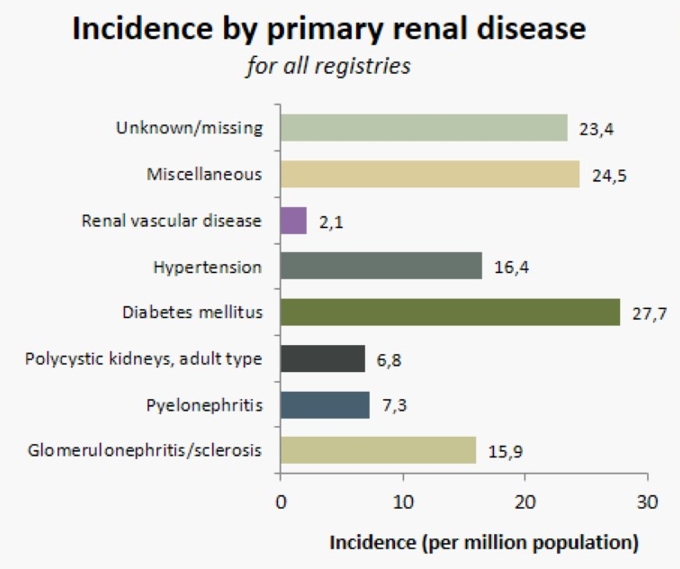A ERA synopsis for nephrology practice of the 2023 ESH Guidelines for the Management of Arterial Hypertension
Medical professionals
Discover our information materials for medical professionals

Chronic Kidney Disease - Basics
According to Kidney Disease: Improving Global Outcomes (KDIGO), Chronic Kidney Disease (CKD) is defined as abnormalities of kidney structure or function, present for more than 3 months, with implications for health. CKD is classified based on Cause, GFR and Albuminuria category, abbreviated as CGA.
The onset of CKD is usually insidious and may not cause any symptoms until CKD stage 4. First symptoms are unspecific so many patients do not consult their doctor and even then, it might not be easy to relate the symptoms to kidney damage. As the kidneys perform a number of tasks, the loss of kidney function leads to a variety of initially unspecific symptoms.
Many patients often produce light-coloured, pale urine and store water in the legs, around the eyes or all over the body – oedema. Foamy urine can be an indication of proteins in the urine. Some patients also excrete discrete amounts of blood in their urine (microhematuria). Elevated high blood pressure (greater than 140/90 mmHg) or high blood pressure that is increasingly difficult to control is often an early sign of kidney disease. High blood pressure is not only a consequence of kidney failure, but also a cause.
Once established, CKD cannot be cured. This is why the assessment of risk factors and regular kidney check-ups by general practitioners in high-risk patients are so important.
When the kidneys fail, the blood must be cleaned from uremic toxins through dialysis. If left untreated, kidney failure is life-threatening. Being dialysis dependent has a significant impact on quality of life and life expectancy. If appropriate, kidney transplantation is the optimal form of renal replacement therapy.
Causes of CKD
The most important and frequent causes of CKD include high blood pressure and diabetes mellitus. Inflammation of the kidney tissue also reduces the filtering capacity. Other causes of CKD and kidney failure are congenital diseases, polycystic kidneys, and calcification of the kidney vessels so-called arteriosclerosis. Prolonged obstruction of the urinary tract can also damage the kidneys as can certain medications. Anyone on long-term medication may need to have their kidney function monitored.
Index
- Chronic Kidney Disease – Basics
- Kidney check-up
- Other informative projects
Risk Factor

Facts & Figures
Kidney check-up
General practitioners have a key role in detecting and monitoring kidney health and, together with specialists, in risk reduction. We encourage awareness, regular reviews and monitoring of patients at risk so that CKD can be detected at an early stage thus allowing appropriate treatments to be instigated. Consequently, the progression of established kidney disease can be slowed or even halted and the risk of associated complications reduced.
Individual Risk Factors
It is important to consider the personal risk factors of each patient to assess their kidney health: diabetes mellitus, hypertension, cardiovascular disease, overweight, family history of kidney disease or higher age. According to the IDF Diabetes Atlas (International Diabetes Federation), 1 in 2 adults with diabetes is not diagnosed.
To assess the patient’s risk for kidney damage, the medication history, dietary behaviour, supplements and herbal remedies should be reviewed as well. The frequent or constant use of specific drugs, such as over-the-counter nonsteroidal anti-inflammatory drugs (NSAIDs) may cause kidney damage in the long term.
Two components
Other informative projects
References
- NCD Risk Factor Collaboration (NCD-RisC) (2021): Worldwide trends in hypertension prevalence and progress
in treatment and control from 1990 to 2019: a pooled analysis of 1201 population-representative studies with 104 million participants. In: The Lancet 398: 957–80. DOI: https://doi.org/10.1016/S0140-6736(21)01330-1 - Narres, Maria; Claessen, Heiner; Droste, Sigrid; Kvitkina, Tatjana; Koch, Michael; Kuss, Oliver; Icks, Andrea (2016): The Incidence of End-Stage Renal Disease in the Diabetic (Compared to the Non-Diabetic) Population. A Systematic Review. In: PloS one 11 (1), e0147329. DOI: 10.1371/journal.pone.0147329
- Thomas, Merlin C.; Cooper, Mark E.; Zimmet, Paul (2016): Changing epidemiology of type 2 diabetes mellitus and associated chronic kidney disease. In: Nature Reviews. Nephrology 12 (2), 73–81. DOI: 10.1038/ nrneph.2015.173




